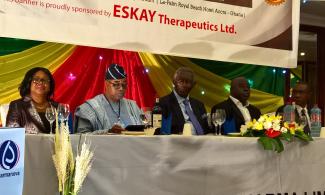
West African Pharmaceutical Manufacturers' Association (WAPMA), the body that represents about 200 pharmaceutical manufacturers in the West African region held its 10th anniversary conference and AGM on March 29th, in Accra Ghana.
Delegates to the conference were joined by international dignitaries, including the former president of Ghana, HE John Agyeman Kufour, to explore relevant issues for the pharmaceutical industry within the sub-region. International agencies such as GIZ WAHO, UNIDO, and WHO were also represented.
The highlight of the conference was the election of a new executive to guide the association in the achievement of its strategic objectives. To head the new WAPMA executive, Mr Okey Akpa was elected as the incoming President.
googletag.cmd.push(function() { googletag.display('content1'); });
Mr Okey Akpa (FPSN) is the Chief Executive Officer of SKG Pharma Nigeria Ltd and sits on the board of several Nigerian and British blue chip companies. He is also the Chairman of the Pharmaceutical Manufacturers Group of the Manufacturers Association of Nigeria.
Below is the text of Mr Okey Akpa's acceptance speech.
googletag.cmd.push(function() { googletag.display('content2'); });
ACCEPTANCE SPEECH BY MR OKEY AKPA (FPSN), PRESIDENT WAPMA
Protocol
I would like to express my sincere and humble appreciation to all members present, for being found worthy by this august body to serve as its president. Thank you for placing your trust and confidence in me to lead this our association during what some have termed the most interesting, but also challenging period for our industry and our sub-region.
In 1990, the world decided to adopt a new strategy for tackling widespread issues of multidisciplinary nature that were of significant global importance. For a quarter of a decade, the Millennium Development Goals formed a framework for developing solutions to the world’s problems, as well as monitoring and evaluating various countries projects. It is worthy to note that of the eight goals, at least three were focused on health improvement. To continue its successes, the framework last year morphed into the SDGs, with ‘sustainability’ identified as the game changing factor.
The most important lesson that Africa needs to learn from the evolution of the MDGs and other such programmes, is that the ultimate responsibility to developing sustainable solutions to our problems is ours. The desperate need for a change in strategy is even more acute when it comes to healthcare. In the past few years, we have all been witnesses to the global reaction to West African health emergencies such as Ebola. There is also overwhelming evidence of Global Pharma’s neglect of tropical diseases, many of which are prevalent in West Africa.
My tenure will therefore herald a change in thinking regarding how we engage with policies, both within the industry, as well as at a sub-regional level. One good example is our sub-regional approach to medicines’ self-sufficiency and its relationship to our ability to ensure health security for our people. According to the United Nations, Health security is a key dimension of the Human Security Concept and forms the basis of the new movement towards a world that is safe and secure from illnesses and diseases.
As medicines produced by WAPMA members form the majority of healthcare interventions, it is clear that our participation in ensuring access to medicines is the cornerstone for attaining health security at all relevant levels. Currently, the lack of robust and comprehensive engagement with West African Pharmaceutical Manufacturers means that member Nations remain at significant risk of drug insecurity together with consequent widespread effects on the health of over 300 million West Africans. Furthermore emerging evidence indicates that the potential for indigenous pharma to contribute to sub-regional economic growth and manpower development is grossly underutilized. With the current global economic slowdown, such potential can no longer be ignored.
The sub-region’s recent history and the significance of the need to guarantee access to high quality medicines for our people, underscores the need for WAPMA together with our partners in Government, to develop sustainable and comprehensive policies that are African in content and context.
As such, some of the strategic approaches that will adopted by WAPMA across the region over the next two years will include enhancing sub-regional Research and Development capacity for the development of indigenous therapies and interventions for conditions prevalent to West Africa. We will also strongly support knowledge exchange as well as increased collaboration and cooperation among member nations, within the sub-region.
Before I conclude, I want to commend the support of our Development Partners, especially WAHO, UNIDO, and WHO. I also want to thank the founding fathers of WAPMA for their foresight in understanding the need for regional cooperation in the industry, and their fortitude in sustaining the Association till now.
Once again, Medaasi, Merci Beaucoup, and Thank You All.
Mr Okey Akpa (FPSN)
President, WAPMA
googletag.cmd.push(function() { googletag.display('comments'); });